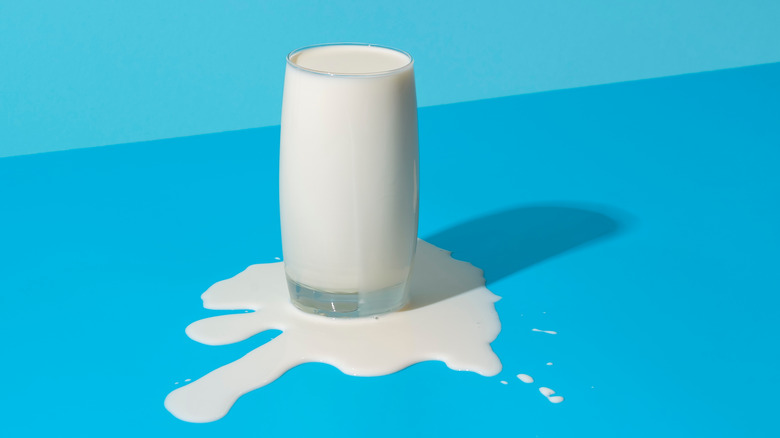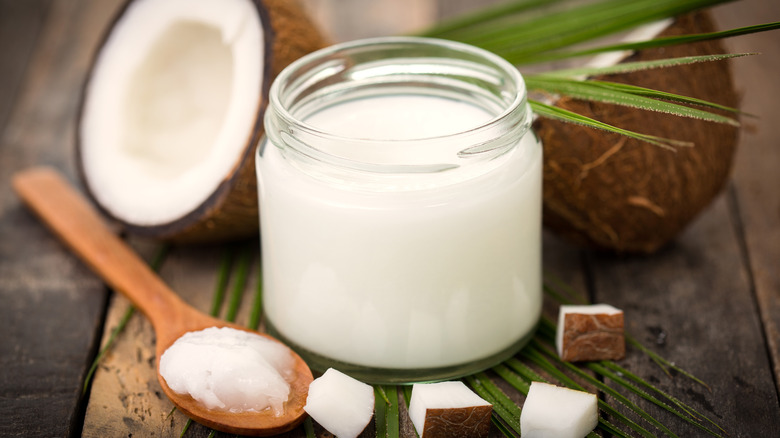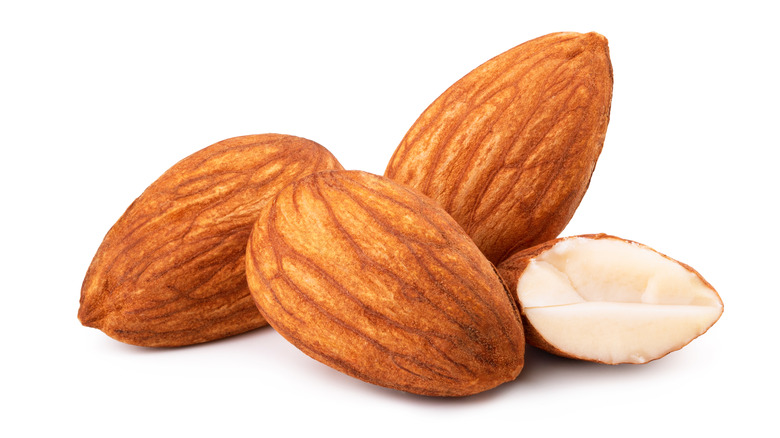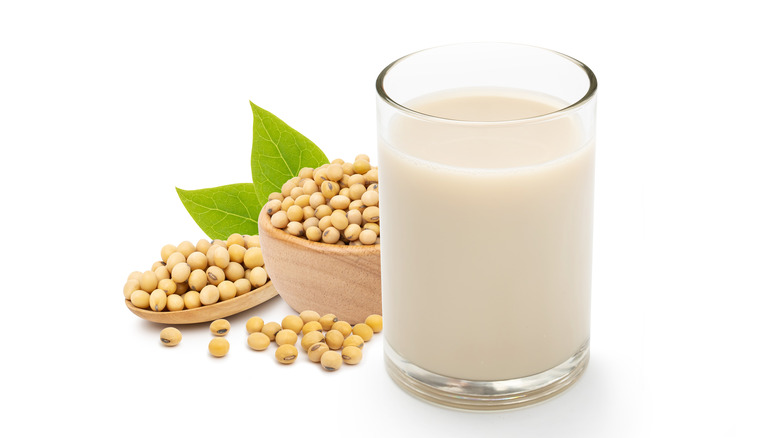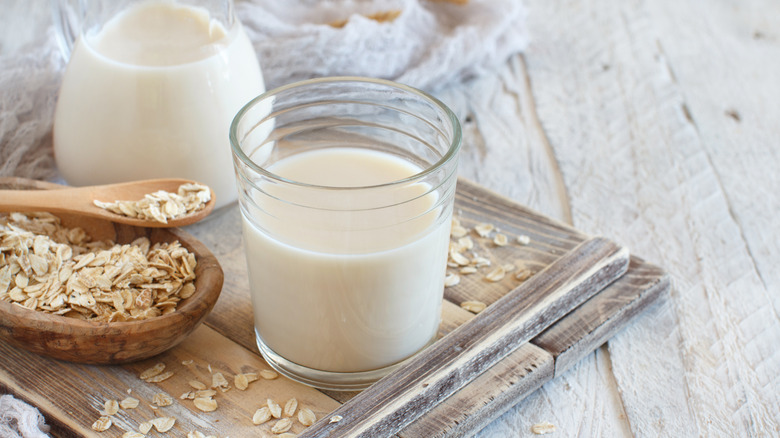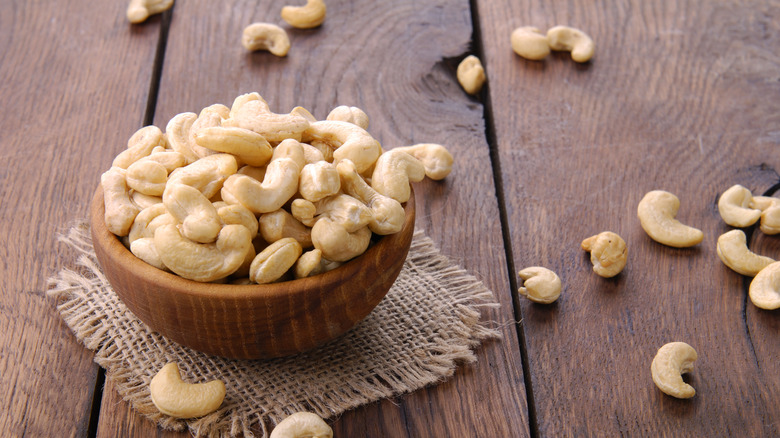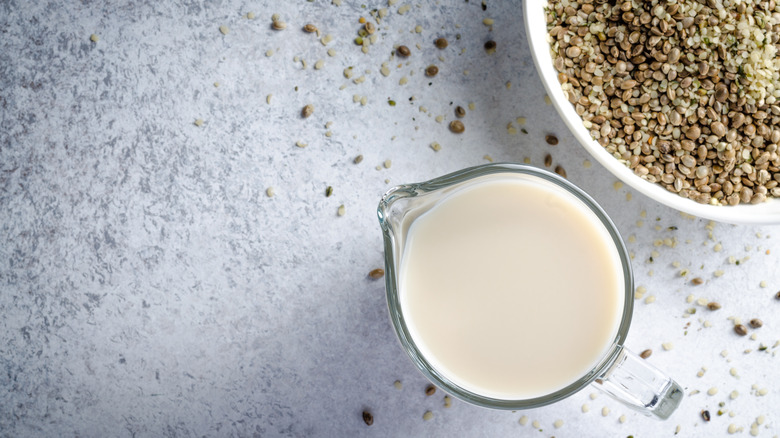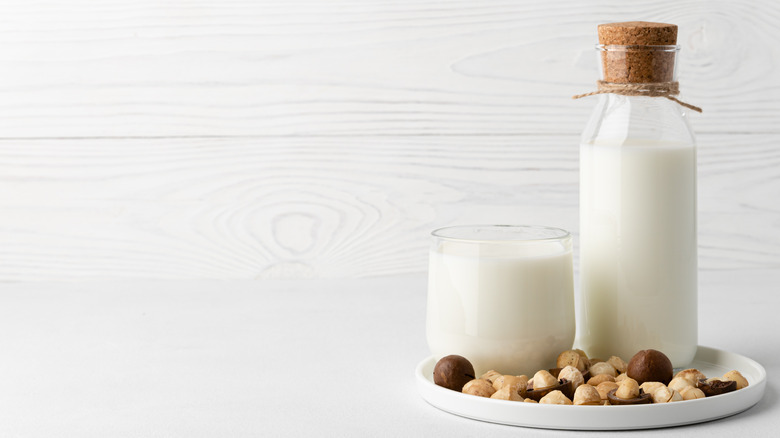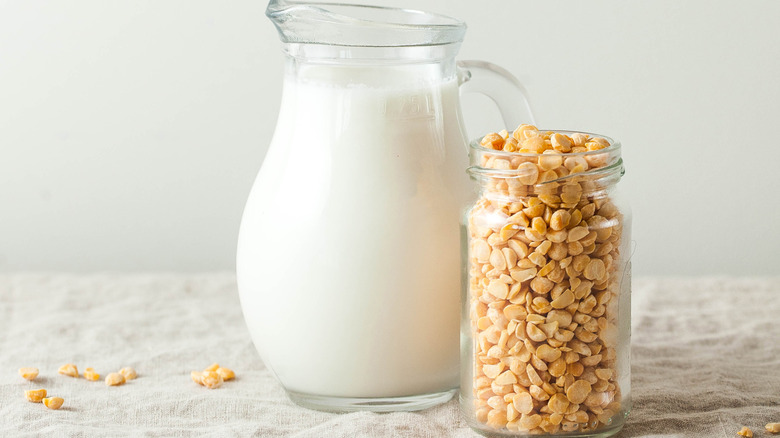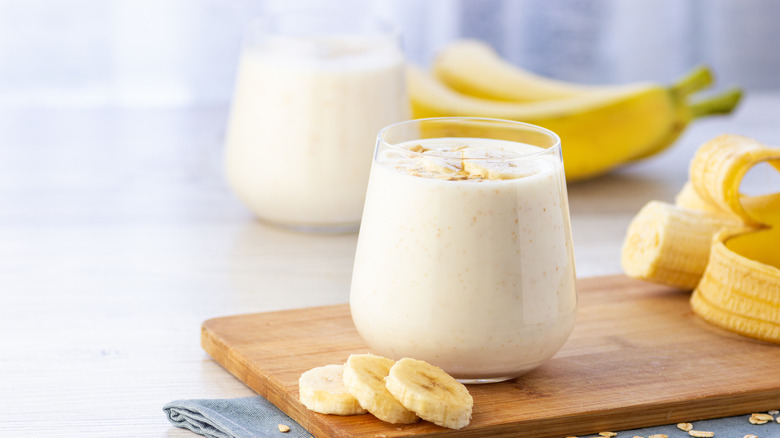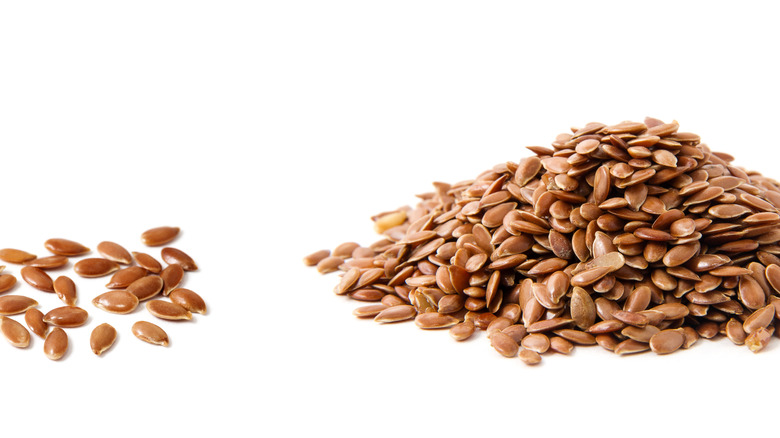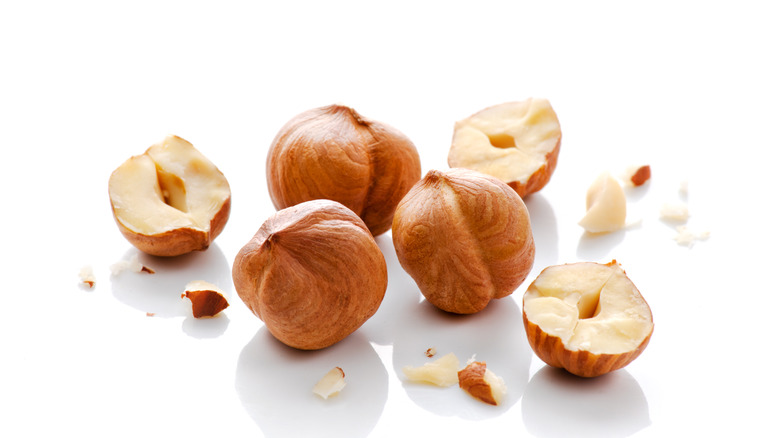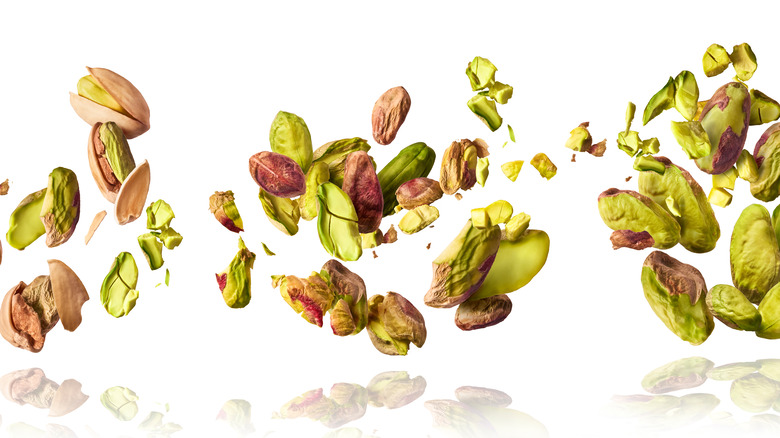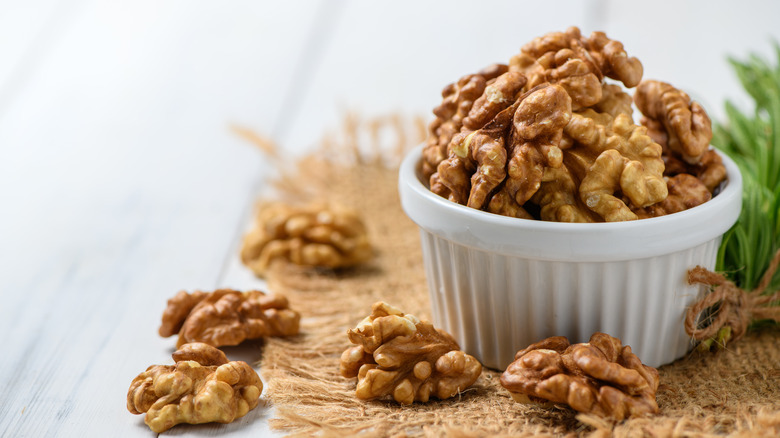Every Plant-Based Milk, And What It's Best For
The plant-based milk market has exploded in the last few years, with legions of consumers deciding for myriad reasons to reduce or eliminate their consumption of dairy products. Some people choose to go plant-based because it reduces their environmental footprint, while others do it because of concerns about animal welfare, or because their bodies can't digest dairy products. Some plant-based milks may have nutritional advantages over dairy milk as well. The Good Food Institute reports that as of 2020, 15% of all milk purchased in the U.S. was plant milk, totaling around $2.5 billion in sales. With all that money on the table, tons of companies are entering the U.S. market making milk out of all kinds of plants, even unlikely options like potatoes.
Not all milked plants come out the same, however. Dairy milk is incredibly versatile, showing up in a wide variety of sweet and savory recipes. Different plant milks are better for mimicking different parts of cow milk's playbook. Not only that, but each type of vegan milk has a different nutritional profile, environmental impact, and price point. This guide will help you choose what type of plant milk will work best for your plant-based dairy needs.
Coconut Milk
As the Food Network explains, you need to pay attention to what's in the container when you shop for coconut milk at the store. Not all coconut milks are created equal. Coconut milk beverage is a drink made from coconut milk, sweeteners, and water that has a similar consistency to 2% dairy milk (via GoDairyFree). It's sold in both refrigerated and shelf-stable versions, and you'll probably find it next to the other plant-based milks in the supermarket. It has a mild flavor and works as a substitute for dairy milk on cereal, as a drink, in coffee, and in baking. However, it will not work for any recipe that calls for a can of coconut milk.
Canned coconut milk is made of an equal mixture of coconut pulp and water. You'll often find it with the Asian products in a standard grocery store. It's traditionally used in South and Southeast Asia for sauces, curries, and desserts. It's also used in Western cooking, most commonly in sweet recipes. The texture is significantly thicker than coconut milk beverage, with a large amount of fat that tends to separate from the liquid as it sits in the can. Canned coconut milk and its richer cousin, coconut cream, thicken dishes and add richness to food. You still need to take care to read the label when you buy canned coconut milk, as some cans are pre-sweetened, which you don't want for savory food.
Almond Milk
Almond milk is the most popular milk alternative in America as of 2020, accounting for over 60% of plant-based milk sales (via Food Dive). It's not hard to see why, as it combines taste, versatility, and nutrition in a way that's hard to match. Healthline notes that almond milk is packed with vitamin E, boasting 110% of the recommended daily value in one eight-ounce serving. Commercial almond milk also tends to be fortified with calcium and vitamin D. It's much lower in calories than dairy milk, as well.
Almond milk works beautifully in smoothies and on cereal. Allrecipes also ranked it as one of the best plant milks for baking, noting that you should choose a sweetened variety for baked goods to replicate the sugar in dairy milk. (It can be substituted one-to-one with dairy milk in most recipes.) You can even mix it with lemon juice or vinegar to make plant-based buttermilk for pancakes or biscuits!
Any discussion of almond milk must mention its toll on the environment. According to the University of California San Francisco, almond milk's popularity has resulted in the draining of thousands of acres of wetlands and is causing parts of the San Joaqin Valley to sink because of how much groundwater it takes to grow almonds. If you drink plant milk for environmental reasons, you may want to choose a non-almond variety.
Soy Milk
Soy milk is possibly the most ancient food on this list. In Asian countries, one of the most common ways to use soy milk is to add coagulants to it to make tofu, a process that dates back thousands of years (via IFT). The Spruce Eats notes that Asian cultures also have a long history of drinking fresh soy milk with breakfast. In areas where soy milk is a traditional part of the diet, manufacturers preserve its soybean taste, and you can buy canned sweetened soy milk in a plethora of fun flavors. In the U.S., consumers tend to view soy milk as a substitute for cow's milk, and brands tend to cater to local tastes by producing products with a neutral, mildly sweet flavor.
Researchers wrote in "The Journal of Food Science and Technology" that soy milk was the best nutritional substitute of any plant milk they tested (via Time). Soy milk's hefty dose of protein differentiated it from other popular milk alternatives. That protein also makes it the best plant milk for baking according to Allrecipes, contributing to texture and browning in a way that closely mimics dairy milk.
Oat Milk
Oat milk continues its rise to dominance in the U.S. plant milk scene. CNN reports that oat milk sales increased twelvefold between 2019 and 2021. Coffee culture is one of the biggest factors driving the popularity of oat milk. Market analyst Cara Rasch says that the drink's flavor complements coffee in a similar way to cow's milk (via CBS). Starbucks has oat milk on the menu now, and Perfect Daily Grind says thousands of independent cafes stock the popular brand Oatly. Manufacturers make special barista blends of oat milk that perform better in lattes and cappuccinos than most alternative milks, using stabilizers to create a product that froths and foams like real dairy.
Oat milk is great for more than just coffee, too. It causes less environmental damage than cow's milk, almond milk, or rice milk (via BBC), and it doesn't contain common allergens like dairy, soy, or tree nuts. It's also Martha Stewart's pick to replace dairy in baking, as it tends to have a creamier texture than other plant-based options. Just make sure not to use the sweetened kind in savory recipes.
Cashew Milk
Cashew milk is another good choice if you're looking for something on the creamier side of the spectrum. Fine Dining Lovers says its luscious texture and mild flavor make it a great direct substitute for cow's milk in a variety of contexts. Its rich mouthfeel could make you think it was higher in calories and fat than other plant milks, but it's actually one of the lightest options in the category. WebMD notes that cashew milk has fewer calories than oat milk, coconut milk, or almond milk, with only 25 calories per serving for the unsweetened kind. The techniques used to make industrially-produced cashew milk strip away many of the naturally occurring nutrients in the nuts. Manufacturers tend to add vitamins and minerals to counteract this, fortifying their cashew milk with vitamin A, vitamin D, iron, and calcium.
You can use cashew milk in smoothies, oatmeal, and other breakfast dishes. It's also great in savory foods because it doesn't have much inherent sweetness. It lends a nice creaminess to coffee, but it has a propensity to curdle in the mug. You can counteract this by heating it up in the microwave before adding it to your coffee, or by switching to lower-acid coffee beans.
Hemp Milk
We are in the middle of a hemp renaissance, with the versatile plant showing up in textiles, protein powder, and supplements. Lately, the seeds of the hemp plant have earned acclaim for their nutritional benefits. Hemp milk is made from blending hemp seeds with water and flavorings, and it delivers more health benefits than most other plant milks (via Healthline). Hemp contains every essential amino acid, as well as a variety of healthy unsaturated fats. The relatively high protein and fat content also give hemp milk a more substantial texture and mouthfeel than some other, more watery plant milks.
Hemp milk is made from the same plant as marijuana, but you don't have to worry about getting a buzz from this product. The seeds of the cannabis plant contain only trace amounts of THC. You can substitute hemp milk for dairy in most recipes, but hemp milk does have a stronger flavor than almond milk or soy milk. It has a pronounced nuttiness that suits some recipes well, and others not so much. Save it for things like cereal and oatmeal that would benefit from an extra kick of nutty flavor.
Macadamia Milk
Like hemp seeds, macadamias are on the fattier end of the nut spectrum, resulting in a milk that's creamier and more unctuous than some other options on the market. Mind Body Green says that this fat is primarily the healthy monounsaturated kind, which has a variety of positive effects on the body. Since macadamia milk is high in fat and low in carbohydrates, it can be a good milk substitute for people on low-carb diets like keto.
Although unsweetened macadamia milk has no natural sugars, its creaminess makes it a great fit for desserts and other sweet applications. It would be a perfect base for homemade vegan ice cream or as a finisher for a blended winter soup. You could also follow the lead of this cook from Yup It's Vegan and use macadamia milk in place of cream in a caramel sauce. If you make your own macadamia milk, you can also save the nut pulp to add to cakes, cookies, or breakfast dishes.
Pea Milk
Most plant-based milks are made from nuts or seeds, but this kind uses a different base: ground yellow peas. Pea milk isn't exactly the most appetizing name, so we'll call it by the name of the brand that put it on the map: Ripple. The brand has several advantages over other types of plant milk. It's naturally high in protein, and it's a great choice for people who can't eat soy, nuts, or gluten. It's also fortified with vitamin B12, which you need if you're following a plant-based diet as it only occurs naturally in animal products.
Ripple is markedly thick, more so than dairy milk. The texture is more reminiscent of half-and-half or cream. That makes it great for some applications, but it's a little strange if you're trying to drink a glass of the original flavor by itself. The chocolate flavor is a different story, as the thickness pairs with the sweet chocolate to make an indulgent experience that's almost dessert-like. Since Ripple is so thick, it's a perfect starter ingredient for making vegan cheese or creamy vegan dressing.
Rice Milk
Rice milk is made by blending either soaked or boiled rice with water and then straining out the solids (via Alpha Foodie). Rice isn't a common allergen, so rice milk is a good option for people with many food intolerances. Rice milk tends to be on the thinner side, although if you make it yourself you can control the rice-to-water ratio and make it a little bit thicker. It has a mild, gently sweet flavor if made from white rice, so you might like it if you find the nutty taste of other alternative milks unappetizing. If you choose brown rice, the milk will have a more complex, nuttier flavor.
One genius use for rice milk is this vegan rice pudding from Food52. Instead of using dairy to achieve a creamy texture, this recipe doubles down on rice to give you a plant-based pudding that doesn't sacrifice on taste. Another classic rice milk-based dish is horchata, which comes in many forms but usually starts by making homemade rice milk. Try this easy horchata recipe as a base for experimentation!
Banana Milk
Banana milk stands in a category all its own in the non-dairy section: fruit-based milk. One brand, Mooala, blends puréed bananas with water, cinnamon, and sunflower seed butter to make its signature product. One advantage of banana milk is that its main ingredient has natural sugars, so banana milk is sweet without having to resort to adding sugar or no-calorie sweeteners.
One major disadvantage (or at least complication) is that bananas have a distinctive, strong flavor, and that flavor sings loud and clear even when the fruit is turned into milk. Banana milk isn't what you should reach for when you make plant-based mashed potatoes, mac and cheese, or anything else savory. For the sweet stuff, particularly things you would put bananas in anyway, it's a solid choice.
Try it in smoothies, overnight oats, or pancakes to add a nice hint of banana flavor, or pair it with chocolate to make vegan brownies. It also would work admirably as the base for vegan ice cream.
Flax Milk
Flax seeds are culinary workhorses, able to transform into whatever they need to be. Round flax mixed with water is one of the best plant-based egg substitutes for baking, doing wonders for vegan muffins. Flax is a great addition to a healthy diet, boasting high levels of omega-3 fatty acids that can promote heart health and reduce the risk of cancer (via Spoon University). The seeds are also super high in fiber, which is generally a good thing, although it might upset certain peoples' stomachs. Unlike other plant-based milks that consist of a purée of nuts or seeds that is then strained, flax milk is made by thinning out flax seed oil with water.
Flax milk has a pretty mild flavor, so it's a versatile player in the kitchen. It works equally well in savory recipes like this butternut squash soup and in sweet treats like this French toast bake.
Hazelnut Milk
For many of us, hazelnuts exist only as an ingredient in Nutella. That's not actually as far from the truth as you might think, since Nutella uses one-fourth of the world's hazelnut production. Even outside of Ferrero's world-conquering spread, hazelnuts usually get paired with sweet flavors like chocolate and honey. It turns out that if you don't dump a bunch of fat and sugar on them, hazelnuts are actually quite healthy, boasting impressive levels of antioxidants and vitamin E (via Elmhurst).
Hazelnut milk feels right at home in all the usual plant milk haunts, from cereal to oatmeal to smoothies. Since hazelnuts play so well with dessert flavors, hazelnut milk is best used in sweeter dishes. If you want something truly indulgent, try swapping the usual cream for hazelnut milk when you make the ganache for chocolate truffles. The chocolate-hazelnut combo tastes a bit like Ferrero Rocher Chocolate.
Pistachio Milk
Most plant-based milk is white to off-white, similar to cow's milk, but pistachio milk is a daring shade of green. Like most green things, it's good for you. Pistachio milk is packed with potassium and contains compounds that can lower cancer risk and reduce bad cholesterol (via Real Simple). It tastes rich and sweet, with a definite hint of the distinctive flavor of pistachios. One major downside of pistachio milk is the cost. Pistachios are more expensive than the base ingredients used in more common plant milks. Pistachio trees are picky about where they grow, and they take a long time to bear fruit.
Pistachio milk can make a good latte, although you have to be careful about the coffee curdling the milk (via Let's Eat Cake). Because of the high price, pistachio milk is best used in dishes that highlight its unique flavor. Pistachio gelato is already delicious, but what if you used pistachio milk as the base? It would also be great in Middle Eastern, Indian, or Mediterranean desserts, as flavors like honey and rosewater make pistachios taste even better.
Walnut Milk
Walnuts are packed with nutrients that are friendly to your body. Healthline notes that they have the most antioxidants of any widely-available nut, and they're also high in omega-3 fatty acids. They may help preserve brain health and function in old age, and they might reduce the risk of type-2 diabetes. Despite all of these benefits, commercial walnut milk is a relative latecomer to the scene, only reaching store shelves a couple of years ago (via Elmhurst).
Walnut milk retains the characteristic bitterness of walnuts, so you should use it in places where that makes sense, like coffee cake or caramel. You could also choose to cancel out walnut milk's brain benefits by mixing it with booze. This recipe for milk punch from Honest Cooking updates this historical libation by mixing walnut milk with tequila, lime juice, and cucumber. The roasty taste of walnut milk would also sub for the dairy well in this more traditional milk punch recipe with bourbon and nutmeg.
